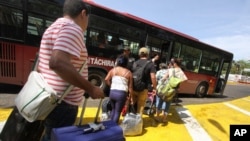Shaken by the deportation of over a thousand compatriots, Venezuela's roughly five million Colombians are grappling with whether to stay on in the
crisis-hit country that has become increasingly unlivable.
Many were economic migrants lured by an oil-fuel boomed that earned the OPEC country the nickname 'Saudi Venezuela' in the 1970s, while others fled Colombia's half-century guerrilla war.
As socialist-led Venezuela's economy tanks, however, thousands have already packed their bags to return to recovering Colombia and leave behind severe shortages of medicines and meat, unchecked crime and destructive inflation.
Now, some say President Nicolas Maduro's decision to close several border crossings last week and deport what Colombia says is over a thousand people, is the last straw.
"I want to leave as soon as possible. This is a major abuse of power," said Yair Acevedo, 48, a publicist who like dozens of other Colombians queued outside a Colombian consulate in Caracas under the tropical sun on Wednesday to get his papers in order.
"Life is Venezuela is a disaster now. Maduro thinks he's going to lose the elections, so this is a distraction," he said.
Maduro, whose Socialist Party is forecast to fare poorly in the December 6 parliamentary election, says the crackdown is necessary to stop the Colombian right, smugglers and paramilitaries from plotting to worsen shortages and subvert him.
Critics counter currency and price controls are to blame for the lucrative smuggling undertaken by citizens of both nationalities along the porous border.
Outrage
Hundreds of deported Colombians have waded across a river carrying fridges, chickens and mattresses. Many told Reuters they lived in Venezuela legally.
"It's complete injustice. I hadn't thought about leaving but this makes me think about it - who knows if they try to deport me even though I'm legal?" said Ana Gonzalez, 65, a Caracas housekeeper whose remittances home have plummeted due to the collapse of Venezuela's currency.
Leaving is not easy for many of these often poor migrants, especially as many have Venezuelan partners or children.
"This really shook us up. But I want to stay because I've made my entire life here, I have a house here," said another Colombian, Patricia Martinez, 40.
Some upset Colombians say conservative President Juan Manuel Santos is not taking a firm enough hand.
"I'm outraged by what's happening. The Colombian government should be stronger in protecting its citizens," said Luis Vergara, 29. "I feel unprotected on both sides."





